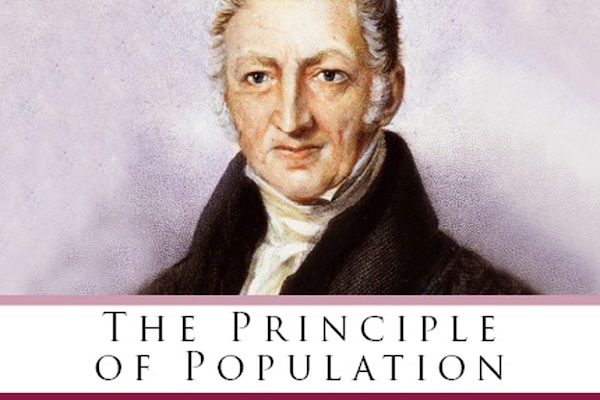Thomas Malthus: Still Relevant After More Than 200 Years
With the earth’s population having almost tripled in the last 60 years, it is easy to think that human overpopulation is a relatively new concern. In fact, warnings about the number of people that our planet can reasonably sustain began to be raised, documented and published more than 220 years ago.
Thomas Malthus was born in Surrey, England in 1766, at a time when the earth’s population was around 800 million, less than a tenth of what it is today.
As a boy, Malthus was privately educated at home, before being admitted to Jesus College, Cambridge in 1784. He graduated in 1788, went on to earn a Master of Arts degree in 1791, and in 1793 become elected a Fellow of Jesus College.
In 1798, Thomas Malthus published what became his most well-known work, An Essay on the Principal of Population. The Essay was considered a radical publication at the time and argued that increases in human population would eventually diminish the ability of the world to feed itself. His conclusion was based on the thesis that populations expand in such a way as to overtake the development of land to produce sufficient crops to sustain human life.
Malthus wrote that: “… infinite human hopes for social happiness must be vain”, and that “The increase of population will take place, if unchecked, in a geometric progression, while the means of subsistence will increase in only an arithmetic progression. Population will always expand to the limit of subsistence.”
He also suggested, controversially, that only “vice” (including war), “misery” (including famine, want of food and illness) and “moral restraint” (meaning abstinence) could check excessive population growth.
Malthus believed that unless people exercised restraint in terms of the number of children they produced, the resultant growth in population would lead to a shortfall of food, forcing mankind into an inevitable struggle for existence.
It would, of course, have been impossible for Malthus to predict the extent that man could and would go to provide not just the quantities of food required for survival, but also all the other things necessary to support an ever increasing population. But his theories, although a little outdated, resonate more strongly today than ever.


Got something to say about this? Join the discussion now!
Remember, you need to be registered to take part.
- This topic has 0 replies, 1 voice, and was last updated 1 year, 9 months ago by .











